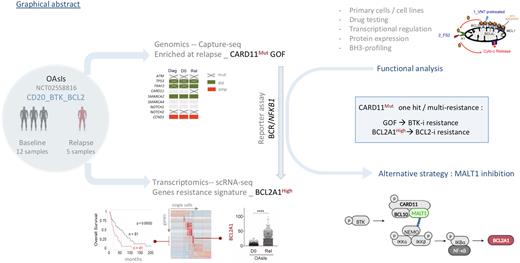Abstract
Background Mantle cell lymphoma (MCL) is a hard to cure malignancy with conventional chemotherapy. We previously reported that combinations targeting CD20 (obinutuzumab), BTK (ibrutinib) and BCL2 (venetoclax) counteracted both tumor intrinsic anomalies and dialogs within corrupted MCL ecosystems. Importantly, this chemo-free combination provided durable complete responses in patients both at relapse or naïve of treatments (OAsIs trial, NCT02558816). Despite high initial response rates, nearly 1/3 of patients rapidly relapsed. To understand this in vivo resistance, we performed targeted sequencing and single-cell RNA-seq to identify key actors involved.
Methods Tumor DNA from patients enrolled in the OAsIs trial were sequenced at baseline (n=12) or relapse (n=5) (Capture xGen technology, IDT). Forty-nine genes and the 9p21 region, described for their impact in lymphoma resistance, were targeted for recurrent SNVs/CNVs. Single cell RNA-seq (3' gene expression, 10X genomics) was performed before treatment (n=4) or after relapse (n=3). Integrated omics analysis was performed to define resistance signatures, at the single cell resolution and associated to gain of function (GOF) mutations. Functional analysis (i.e., reporter assay, BH3-profiling, drug testing) using primary MCL cells and cell lines were performed.
Results Targeted sequencing of tumor cells at relapse highlighted an enrichment of CARD11 GOF mutations (p=0.01). The selective advantage of CARD11MUT cells under OAsIs pressure was further documented with a patient who achieved a complete response before relapsing 12 months after inclusion. Whereas CARD11MUT tumor cells were in a minority (0.0005 %) at the onset of treatment, all the cells carried a heterozygous mutation at relapse (VAF: 50.56%). scRNA-seq of the same longitudinal samples identified a minor cluster (187/4860 sequenced cells) enriched at relapse that was characterized by expression of NFKB1 target genes consistent with constitutive CARD11 activity (Enrichr p<5x10-4). By combining scRNA-seq and mutations, we identified a signature associated with CARD11 GOF, which we named "OAsIs-R" signature. Applied to additional patients' samples, this novel signature allowed the segregation of OAsIs sensitive from resistant cells (scRNA-seq). Of major interest, OAsIs-R signature was also predictive for OS/PFS in MCL patients treated with conventional chemotherapy (GSE93291 and in-house cohorts).
Among the top genes of OAsIs-R signature, we further focused on BCL2A1. We first highlighted its frequent expression in MCL primary cells (n=63) and cell lines (n=7). BCL2A1 overexpression, BH3-profiling (FS2 peptide) and ex vivo drug testing (AnnexinV) further validated a key role of CARD11-related BCL2A1 dysregulation in OAsIs resistance. Ibrutinib deeply reduced BCL2A1 level in CARD11WT cell lines but not in CARD11MUT cells (RNA expression inhibition: 82%, n=4 vs. 0%, n=4), leading to synergistic apoptosis when associated to venetoclax in BCL2A1+ but not in BCL2A1- cells (mean synergy score: 17 vs. 1, n=6). Using reporter assay experiments we showed that CARD11 mutations directly led to an increase activity of BCL2A1 promoter (2 fold more activity, Mut vs. wt), reinforcing the need to target its activity to counteract resistance.
Among druggable strategies to inhibit CARD11, selective inhibition of its partner MALT1, essential for CARD11-BCL10-MALT1 (CBM) activity, is currently tested in early phase clinical trials. We demonstrated that MALT1 protease inhibition led to the reduction of genes involved in OAsIs resistance, including BCL2A1 (RNA inhibition: 40%, n=6), and induced synergistic cell death in combination with venetoclax (mean synergy score: 20, n=4), irrespective of CARD11 mutational status.
Conclusions In summary, our data uncovered control of the mitochondrial apoptosis by CARD11 through BCL2A1 expression. This network has critical implication in the resistance to BTK/BCL2 targeted inhibition. Indeed, CARD11 GOF mutations led not only to BCR-independence and consequently ibrutinib resistance but also to BCL2A1-mediated venetoclax resistance. Nevertheless, our data show that targeting the CBM through MALT1 inhibition reverts this resistance and that MALT1 targeting appears as a promising therapeutic option for counteracting MCL resistance, especially in the context of acquired CARD11 mutation.
Disclosures
Kervoelen:Step Pharma: Research Funding. Moreau:AbbVie, Janssen, Celgene, Amgen, and Sanofi: Honoraria. Le Gouill:Novartis, Kite/Gilead, Janssen: Honoraria, Membership on an entity's Board of Directors or advisory committees, Other: Travel support. Pellat-Deceunynck:Step Pharma: Research Funding. Chiron:Step Pharma: Research Funding.
Author notes
Asterisk with author names denotes non-ASH members.


This feature is available to Subscribers Only
Sign In or Create an Account Close Modal